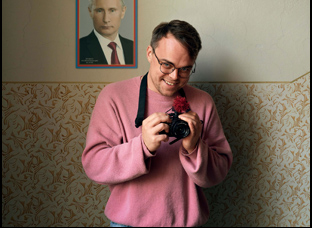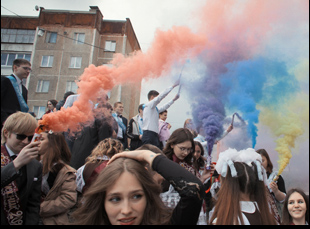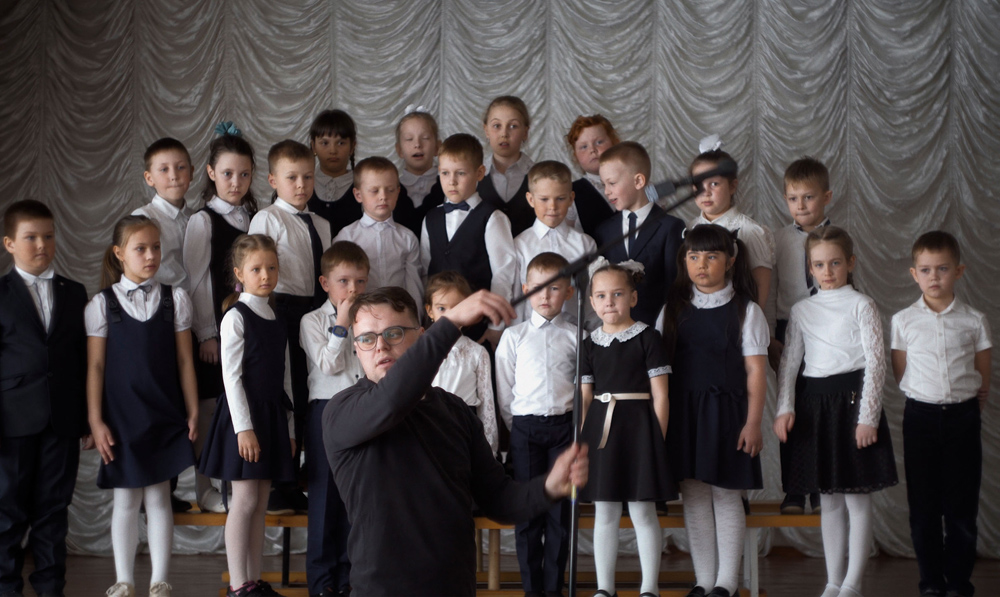In February 2022, Pasha Talankin saw his job change dramatically. Part of the faculty at a school in Karabash – with a population of 10,000 in the mountains of Russia, he collected footage of student activities as an events coordinator and videographer to keep as memories for all to cherish later, but with orders handed down from the Kremlin as part of a New Federal Patriotic Education Act, the footage would act as something else – confirmation that the patriotic songs, lesson plans and morning drills insisted upon by the government were being instituted by the teachers, shaping the consciousness of the youngest generation of Russians in a way that the older staff knew was at odds with reality. Talankin would submit his footage to his superiors, but after receiving a random e-mail from abroad, asking for his reaction to the Patriotic Education Act, he also began filming for his own use when he was well-aware that he had a unique and rare perspective on seeing the Russia propaganda machine at work, downplaying the impact of its war with Ukraine.
“Mr. Nobody Against Putin,” the product of an extraordinary collaboration between Talankin and the Scandinavian-based filmmaker David Borenstein, ends up showing that remarkable reportage truly can come from anywhere as the humble videographer captures his school being flooded with disinformation. Able to laugh off his town’s reputation as the most toxic place on earth when the air has long been filled with the thick fog of pollution, Talankin is more disturbed by what he’s seeing entering the K-12 classrooms and occupies an unusual place at the school without having the authority of a teacher, but older than the students, becoming a bit of a big brother to many. What he documents is another kind of Big Brother as teachers are forced to read off scripts they’ve been handed as if they’ve been taken hostage – insisting that “Europe, not Russia, is suffering the most from the sanctions” that have been levied against them as they’ve proceeded with an unjust invasion, even as some students know of the toll it’s taking from their siblings who have been conscripted – and incentivized to pledge their blind loyalty with the promise of free furnished apartments, among other prizes.
Talankin is well-aware of the absurdity, but after planning not to be a part of it after submitting his resignation as soon as the Patriotic Education Act takes effect, he realizes there’s great value in being in on the joke and pulls his resignation but no punches over the course of filming for two-and-a-half years as the effects on the student body can be seen. Armed not only with a camera but a disarming sense of humor, Talankin makes an extremely dangerous endeavor seem as if it’s all part of a day’s work and his sense of duty is inspiring as a citizen journalist who reveals how deep Russian leadership is willing to go to rewrite history and mislead the public, making its influence outlast whatever is happening in the moment. Still, with Talankin getting this footage to Borenstein against all odds, “Mr. Nobody Against Putin” very much speaks to a precarious present not only in Russia, but internationally as channels of information are being poisoned by those who take drastic measures to keep their hold on power. With “Mr. Nobody Against Putin” making its premiere this week at Sundance in the World Cinema Documentary section, Borenstein kindly spoke about what it took to get such a remarkable look inside Russia to the screen, figuring out how to narrow down hundreds of hours of footage in numerous classrooms to a taut 90 minutes and knowing when to stop collecting footage for a story that sadly has no end in sight.

Basically, it was a casting call for some Russian web content almost like a reality tv show and they were looking for people whose jobs had been affected by the special military operation in Russia in some way. I don’t think that they were intending on getting as political and fiery of a message as they got from Pasha, but someone got that [message] from him and forwarded it to me. That’s how we started. In the beginning, Pasha never thought that he would be a director or anything. He wanted to be cast in a story, but then after several years of working together, we finally got to where we were. It was a long process from him envisioning being cast in something to then saying, “Okay, let’s do this together as co-directors.”
What was the collaboration between the two of you like? I imagine you couldn’t ever meet in person during the process of filming?
It was pretty crazy. You could make a movie about like the making of this movie. But in the beginning, I suggested that we that we make it together, and Pasha is a school videographer, so I thought there was already a quality to the kind of footage that he makes. He’s always carrying a camera with him around school and the kids are so used to that, with him coursing around, that they look at him as some sort of joker that’s holding a camera and his footage had this real day-to-day life quality. He had delivered to me all this footage that he had taken from the years before we had started working together and before the war even started and he had these first-person shots of walking down the halls and I just thought it was so cool how he filmed. We quickly recognized that because he captured the flow of life so well with his way of shooting that you could see just how the school was changing slowly over the next few years, as the ramifications of militarization and special military operation made themselves known.
Once we started working together, we talked every week over a very encrypted line and these talks were still a little tense because I didn’t know if his phone was compromised. Maybe it was ridiculous, but there was a such a distance between us and a sense of danger that maybe we felt more than he did that when we were talking, I was reticent to share too much information about what we were doing. There were a lot of code words and over the course of a year-and-a-half, we were very careful, but he basically kept sending me footage and I kept editing it. I gave him a little bit of direction, but really he was his own man in filming. Finally we met outside of the country near the end of the process. It was actually my first time showing him a rough cut of the film. I had found a Russian friend of mine to do the voiceover that I wrote entirely from his words that we had from when we had spoken. I recorded a lot of our calls that we were doing, so the words were all from him. It was just a crazy moment because he saw it for the first time and I was really nervous, but then he really loved it and we ended up finishing the film together in person.

It was always there. He is a wild, beautiful man and he doesn’t take much direction for me. Really the act of picking up the camera for him is so emotional and he’s just constantly doing it in the school, He was delivering me so much footage that finding the voice in it was just this long act of me sitting in an edit room over years watching everything and if you watch the film now you see there’s four or five [main] characters, but there could have been any one of a hundred people. So it was about sifting through the footage and seeing the interesting patterns of the people around him. Then the tone of the film was about witnessing the way he acts in the film, bringing out who he is and showing people the way I experienced him by watching the footage. What struck me from the beginning is the light tone even in very dark moments [because Pasha] is really concerned about being a light presence for the kids, trying to make things better for them. That presented us the opportunity to make a film with a really unique tone and it dances between light and dark in a way that mimics the main character’s mentality In an interesting way, I think.
It really must’ve been a huge challenge to figure out who to focus on in addition to Pasha. How did certain people like Pavel, the blind loyalist teacher, or Masha, whose brother is in the army, come to the fore?
It was about finding patterns and Pavel obviously was someone that I was interested in quite quickly. His lectures are quite epic. Masha didn’t catch my attention until the very end of [Pasha’s[ filming right before he left. She encountered a profound tragedy, which then spurred me to look through the past footage of her and try to understand what was leading up to that. We found many moments that I didn’t even realize of Masha and Pasha talking about her brother [being] sent to the military. Finding these scenes were like a needle in a haystack and there was so many hours of footage, it was only after I saw what happened to her that I looked back and I found them.
Was there anything that happened that changed your ideas of what this could be?
There were so many things. What’s really interesting about this is the plot was constantly happening as we were filming it and the story of the film itself Is driving the film. It’s a film about [Pasha] deciding he wants to make a film and do this with us and then we had no idea what the ending of this film would be while we were making it. Right before he leaves [Russia], he’s arranging this unbelievable shoot with this graduation and I had made like 20 plans for an ending, but then Pasha surprised us and all of a sudden after focusing for so long on how to end this film, he just delivered it right into my hands.
What’s it like getting to this point with the film?
It was a lot of pressure and a big relief, knowing that this film is going to have a decent premiere because Pasha was putting so much trust and and his life into my hands. We did it together, so it was our hands, but he was making such a big sacrifice through making the film and the idea of that going nowhere really haunted me for a long time. So [I felt] a huge fire in the edit room and I didn’t want to let him down. That motivated me a lot and it feels really good to see it at Sundance and to know his sacrifice was in some way worth it.
“Mr. Nobody Against Putin” will screen at the Sundance Film Festival on January 25th at noon at the Egyptian Theatre, January 26th at 11 am at the Megaplex Redstone, January 27th at 3 pm at the Broadway Centre Cinemas, January 31st at 6 pm at the Megaplex Redstone and February 1st at 1 pm at the Holiday Village Cinemas. It will also be available virtually on the Sundance online platform from January 30th through February 2nd.




